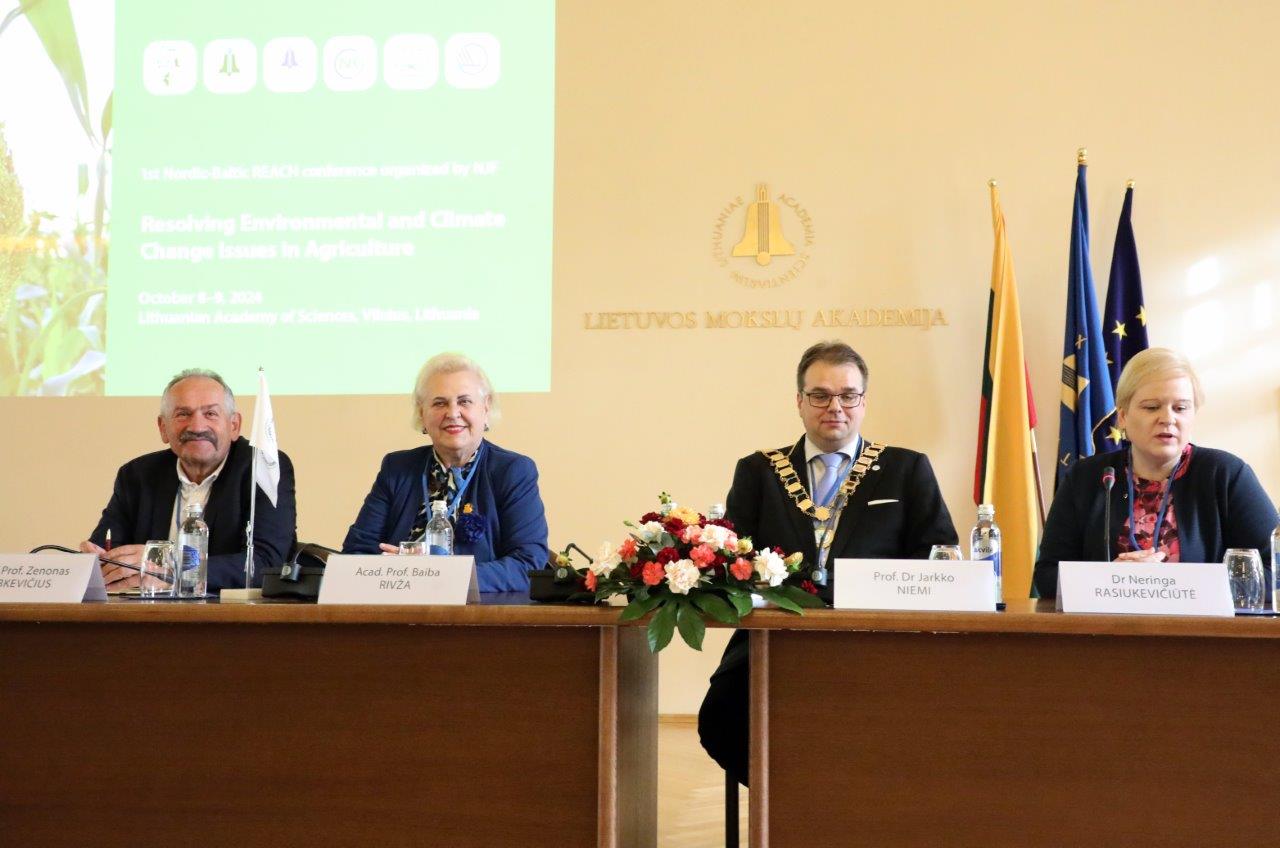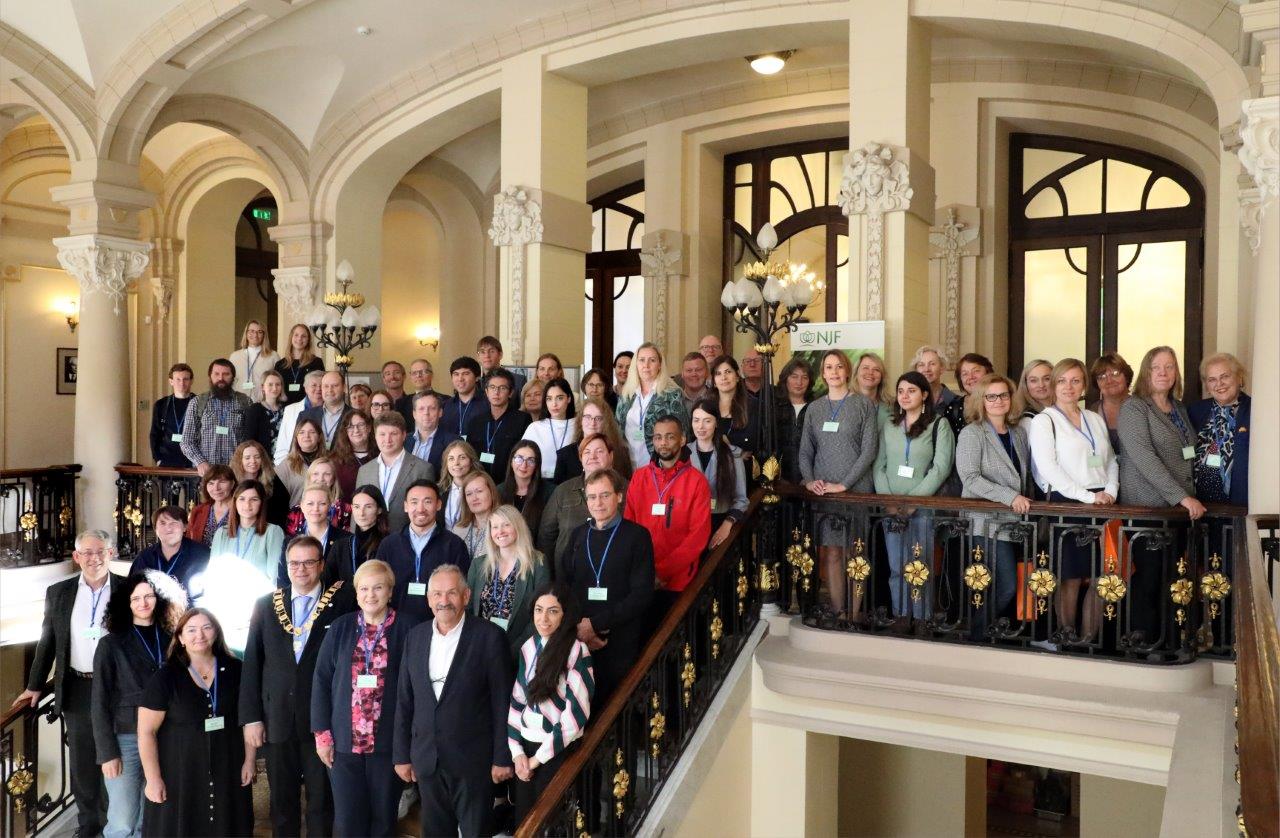Events
Resolving Environmental and Climate Change Issues in Agriculture
30 10 2024-b7afa9b4fc21b7b5e4ce5760464fb019.jpg)
Agriculture in the Nordic-Baltic region shares common challenges, such as short growing seasons and cold temperatures. Climate change influence agriculture and food and feed security in the Nordic and Baltic region in many ways, such as through rising temperatures, changes in precipitation patterns, increased frequency of extreme weather events, and pest and disease risks. These challenges can have major economic, social and production consequences. Research has a pivotal role in providing solutions for how the agricultural sector can respond to these challenges and how it can valorize new opportunities.
On 8–9 October 2024, the International Nordic-Baltic Conference ‘“Resolving Environmental and Climate Change issues in agriculture”’ was held at the Lithuanian Academy of Sciences. The conference was organised by the Nordic Association of Agricultural Sciences (NJF), the Lithuanian Centre of Agricultural and Forestry Sciences, the Division of Agriculture and Forestry Sciences of the Lithuanian Academy of Sciences, the Young Academy of the Lithuanian Academy of Sciences, the Research Funding Organisation under the Nordic Council of Ministers (NordForsk), the Nordic Joint Committee for Agricultural and Food Research (NKJ).

The opening of the conference. Left to right, Prof. Zenonas Dabkevičius (vice-president of Lithuanian AS), Prof. Baiba Rivža (vice-president of Latvian AS), Prof. Dr. Jarkko Niemi (president of NJF), and Dr Neringa Rasiukevičiūtė (a member of the Young Academy of the Lithuanian AS).
The conference was attended by around 75 scientists from Finland, Latvia, Sweden, Norway, the United Kingdom, Ukraine, Denmark, and Lithuania. The conference featured four plenary, 35 oral, and 22 short oral presentations.
Topics covered at the conference included: technological solutions for a cleaner agri-food system; biodiversity, plant and soil health in the context of a changing climate; sustainability and animal production; assessing the sustainability of the economy, the social impact, and the life cycle; modelling of agriculture, the food system, the environment, climate change, and European policies.
Dr Lillian Øygarden, head of research at the Norwegian Institute of Bioeconomy Research (NIBIO), spoke of the climate change challenges and adaptation plans for Nordic and Baltic agricultural strategies. Higher temperatures and longer vegetation seasons are known to have an impact on growing conditions in agriculture (likelihood of higher yields, longer growing seasons, etc.), but there are uncertainties about changes in sowing, tillage, overwintering conditions, and the spread of new diseases and pests. Temperature and rainfall extremes are creating new challenges in terms of the mitigation of the greenhouse effect, with plant adaptation strategies, and increased demand for food.
Dr Heikki Lehtonen, a research professor at the Finnish Institute of Natural Resources, presented solutions for integrating climate change and environmental challenges into economically viable agriculture. Agriculture contributes to greenhouse gases, changes in biodiversity and eutrophication of surface water, thus making adaptation to climate change a major challenge. Intercropping and multiple cropping can help reduce the use of chemical fertilisers and pesticides, increase yields, and improve crop rotation.
Dr Ainis Lagzdins, a professor at the Institute of Landscape Architecture and Environmental Engineering at the Latvian University of Life Sciences and Technologies (LBTU), presented challenges and solutions to reduce nutrient and transport losses in agricultural areas. Studies show that eutrophication of the Baltic Sea is caused by intensive agricultural activities. Agriculture is estimated to contribute 70–90% of nitrogen and 60–80% of phosphorus diffusion to the sea. Solutions are needed to reduce the transport of nutrients from agricultural regions to groundwater.
Per Hansson, the secretary general of the Nordic Joint Committee on Agriculture and Food Research, spoke of Nordic-Baltic agricultural cooperation for sustainable agriculture. The secretary general recalled the importance of international cooperation, presented funding opportunities, and encouraged the Baltic countries to join in the preparation of projects.

A group photo of the conference participants.
The conference provided an excellent opportunity to present research results, make new contacts, exchange ideas, and contribute to the solution of the issues of climate change. Programme and Book of Abstracts of conference is available on https://nordicagriculture.eu/wp-content/uploads/2024/10/2024_REACH_abstracts_book_public.pdf
Prepared by Dr Neringa Rasiukevičiūtė.
Translated by Diana Barnard.
Photo Virginija Valuckienė.
